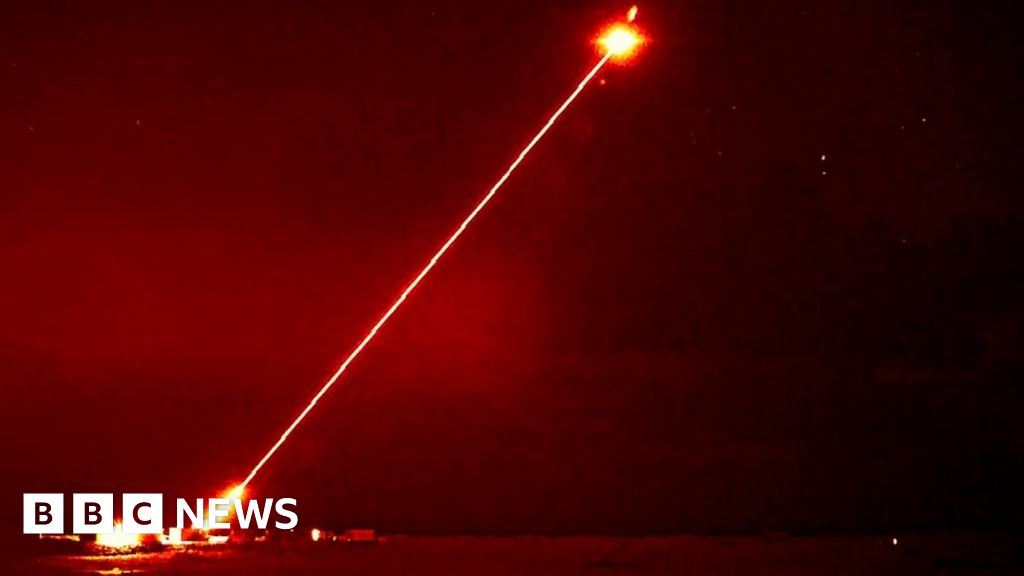The UK has successfully fired a high-power laser weapon against an aerial target for the first time in a trial.
It is hoped that the test will pave the way for a low-cost alternative to missiles to shoot down targets like drones.
The DragonFire weapon is precise enough to hit a £1 coin from a kilometre away, the Ministry of Defence (MoD) says.
At the risk of sounding excessively American, I kinda want one
By rights, every American should have one, preferably funded by tax dollars that could have gone to education.
by rights
We need an amendment! I want this guaranteed!
I too need this for hunting/home defense.
I just hate pound coins that are too far away
It can hit the coin, but it might not be able to hurt it. A missile is a lot more fragile than a coin.
ಠಿ_ಠಿ
Fuck
deleted by creator
Mosquitos will never know what hit em.
There is a Mosquito laser defense system already. I love watching the demo with classical music looped over it
The British should field-test them in Ukraine
If the targeting system is fast and accurate enough, that would be a difficult system to counter without using some kind of laser as well to destroy it, or an attack on its power source.
How about mirrors?
Or a big burst of glitter?
Only if you can deploy glitter faster than the speed of light…
Easy, deploy the glitter before the laser fires.
How would you know when that is?
They hit you with a tracking beam, you deploy glitter, it flies away at the speed of the missle, still being tracked, and then they zap the missle once the glitter is gone.
I know you’re just being facetious, but this shit is real and it’s really out there, and the fact that someone’s taking this seriously is probably the only reason we’re safe.
But the reality is we’re not safe
Depends on who “we” are. WE’RE feeling a bit safer.
MoD hate this one trick
They don’t work well against large missiles or fast moving ones, these are pretty low powered, just enough to melt though a plastic drone or fry some electronics. So a big metal fast moving missile would still need a traditional defensive.
DragonFire is a 50KW system, the US is supposed to have systems that are 6 and 10 times more powerful available in 2024 with a system that’s 20 times more powerful in 2026. The US already has a mobile system, deployed on Army Strykers called DE M-SHORAD, as powerful as the British DragonFire.
A 10KW will down a decent sized drone in 8-15 seconds depending on where it hits. A 50KW will obviously do it faster and the 300KW and up systems will likely make it near instant.
Hmm interesting. Imagine a new arms race between lasers and drones. Country A can make this crazy laser defense system. Country B can make 50x as many drones as country A can handle.
Is it 50kw power draw, or thermal power delivered to the target? Even if it’s power delivered to target, that’s a 10 deg/sec rise in temp for a 1kg mass with the thermal capacity of water, it’s not insane. (If I’m doing my math right)
I believe they are rated by power output at the emitter. I think your math is correct but these systems aren’t heating water, nor are they heating a kilogram of it. They’re simply trying burn through / melt a few ounces of plastic. The journalist who test fired a 10KW system was able to down a drone in about 15 seconds by slagging its propeller so I have to imagine that a 50KW system would do it even faster, potentially as quick as just a second or two.
That’s why I was saying larger missiles would be more resistant, since they’d have higher thermal conductivity aluminum, and a shorter closing time than 15sec.
I wonder how they scale up. Probably not great since the amount of energy lost scales greatly as well, to the point where there’s so much heat it’s not possible to cool anymore.
Laser’s aren’t difficult to counter, and are extremely dependent on uncontrollable operational conditons i.e. the weather.
No one weapon of the military is used in a vacuum, they are awful bloody tools in a large toolbox.
So having this will expand the capabilities and cost effectiveness overall, but not because it’s singularly amazing and unbeatable.
Having such lasers stationary is one thing, but having them mobile another. You need a lot of stored energy to fire those things. And the tracking is probably the hardest task, at least for small or very fast objects, because you need to be so much more accurate compared to autocannons with programmable ammunition.
Having such lasers stationary is one thing, but having them mobile another.
The US already has them. They’re called DE M-SHORAD and they’re mounted on Strykers.
Yes, like the Skyranger 30 HEL, which can be mounted on a Boxer or Lynx KF41, but those are still meant for flimsy aerial targets, not an armored laser turret within a heavily protected compound.
but those are still meant for flimsy aerial targets, not an armored laser turret within a heavily protected compound.
Wait, what? The comment I replied to insinuated that a mobile 50KW system wasn’t possible so I linked you to one that the US already has. You then linked me to the Skyranger which has a LESS powerful laser than DE M-SHORAD and brought up “armored laser turrets within a heavily protected compound.”
I am now confused as to your point.
at least for small or very fast objects, because you need to be so much more accurate compared to autocannons with programmable ammunition.
Quite the opposite. Lasers don’t need to be “led” when shooting, they’re as fast as light. Putting the targeting reticle over the bogey and firing should guarantee a hit without possibility of evasion.
No, not the opposite. Yes, you don’t have to lead the target, but you also have to remain dead accurate onto the target for a prolonged time for the laser to accumulate. They aren’t some video game instagib weapon but heat the target up over several seconds of prolonged exposure to the beam. This means you have to be able to accurately track them, even tiny targets such as drones. Leading the target isn’t really much of an issue at those ranges and with programmable munitions. Tracking those movements is in fact easier because you don’t need that pin point accuracy when you saturate the flight path with thousands of tiny bits of submunitions.
Yes programmable munitions may currently be able to do the job more reliably, especially in adverse weather conditions, but they’re also vastly more expensive. The cheapest option is a CWIZ but even that thing costs something like $40,000 a minute to fire and using missiles can cost up to $1,000,000 each or more. The laser costs maybe $5 each time you fire it.
Economically its a no brainer to use a laser system when possible.
The cheapest option is a CWIZ but even that thing costs something like $40,000 a minute to fire
You don’t have to spam a stupid amount of individual bullets.
You would against a drone swarm, especially if each drone is more than a meter or two away from the next one.
I will say that my memory was bad and so my cost was wrong. A CWIZ has a rate of fire of about 3,000 rounds a minute with each round costing something like $30. So the firing cost per minute is $90,000!
Back to your point; engaging a single target will use about 100 rounds for a cost of $3,000. So if for a modest swarm of 10 drones dispersed such that each has to be targeted individually the total cost would be around $30,000. Contrast that with a HEL system where the total cost would be around $50.
Even if you could upgrade the CWIZ to “one shot one kill” levels of accuracy it would still cost $30 per drone so our little swarm would cost $300 to deal with.
I love the CWIZ but the economics are entirely in favor of HEL systems.
At the same time, you don’t have to worry about the travel time of the projectile because it’s instant you also don’t have to worry about things like air, causing a projectile to drift because there is no projectile. All you need is direct line of sight.
You have a big cloud of submunitions that the target has to get through.
“Oi oi oi governer you got a liscence for that?”
For a giant death laser? I sure hope it’s restricted access.
Who thought the British will get to have King Raptors first?
Rheinmetall has the HEL and I believe the US has one in the works too.
The US already has a variety of HEL systems. The Navy has them, the Army has a Stryker brigade with them along with systems to go in the bed of a pickup truck and one that mounts on a side by side.
I remember seeing them on the tips of planes like 15 years ago.
That’s one I hadn’t seen before. Got any more info?
Here is an alternative Piped link(s):
Piped is a privacy-respecting open-source alternative frontend to YouTube.
I’m open-source; check me out at GitHub.
Well we are very famous for our monarchism
How good would a sequel be, sigh
Generals is a game that would totally not get made today. If not for the GLA being offensive, it was literally banned by China.
The GLA theme is a banger though.
I 100% agree about China, though I think you could do a guerrilla faction “respectfully.” You could do a 2nd world faction as well thematically as some combination of BRICS economies
we should test it on the kreml or putin when is riding shirtless again.
This is the best summary I could come up with:
The UK has successfully fired a high-power laser weapon against an aerial target for the first time in a trial.
It is hoped that the test will pave the way for a low-cost alternative to missiles to shoot down targets like drones.
Defence Secretary Grant Shapps said the technology could reduce “the reliance on expensive ammunition, while also lowering the risk of collateral damage”.
The MoD says both the Army and Royal Navy are considering using the technology as part of their future air defence capabilities.
It is being developed by the Defence Science and Technology Laboratory (Dstl), alongside some industry partners, on behalf of the MoD.
Dstl’s chief executive Dr Paul Hollinshead said: “These trials have seen us take a huge step forward in realising the potential opportunities and understanding the threats posed by directed energy weapons.”
The original article contains 402 words, the summary contains 138 words. Saved 66%. I’m a bot and I’m open source!
Lasers are still a meme weapon. Their range is short and has extremely high loss with distance. Furthermore they need to burn a target for a while so the exact same tactic that defeated the iron dome will defeat these lasers a hundred times harder. A barrage of cheap rockets and drones all at the same time.
I guess the Israelis proved the iron beam works.
Cheaper than missiles! Look how cheap it is to kill people now. Unfortunately we need to kill more innocents now to keep the manufacturers in profit.
How are we gonna make a laser arc? And if it was from an aerial POV it would actually cause less collateral damage than something that explodes.
Why is this comment downvoted? Raytheon exists on Lemmy or something?
I forgot that you have to use /s in every sentence one the internet. /s
Yes this is probably powered…controlled by AI. Fantastic. Okay, we got autonomous dogs and jumpingjacks acrobatic humanoids, when do we allow to mount lasers to their backs? Are laser drones less scary? Nope.
But sure it would be a good weapon to quickly blind the enemy ruzzians.















